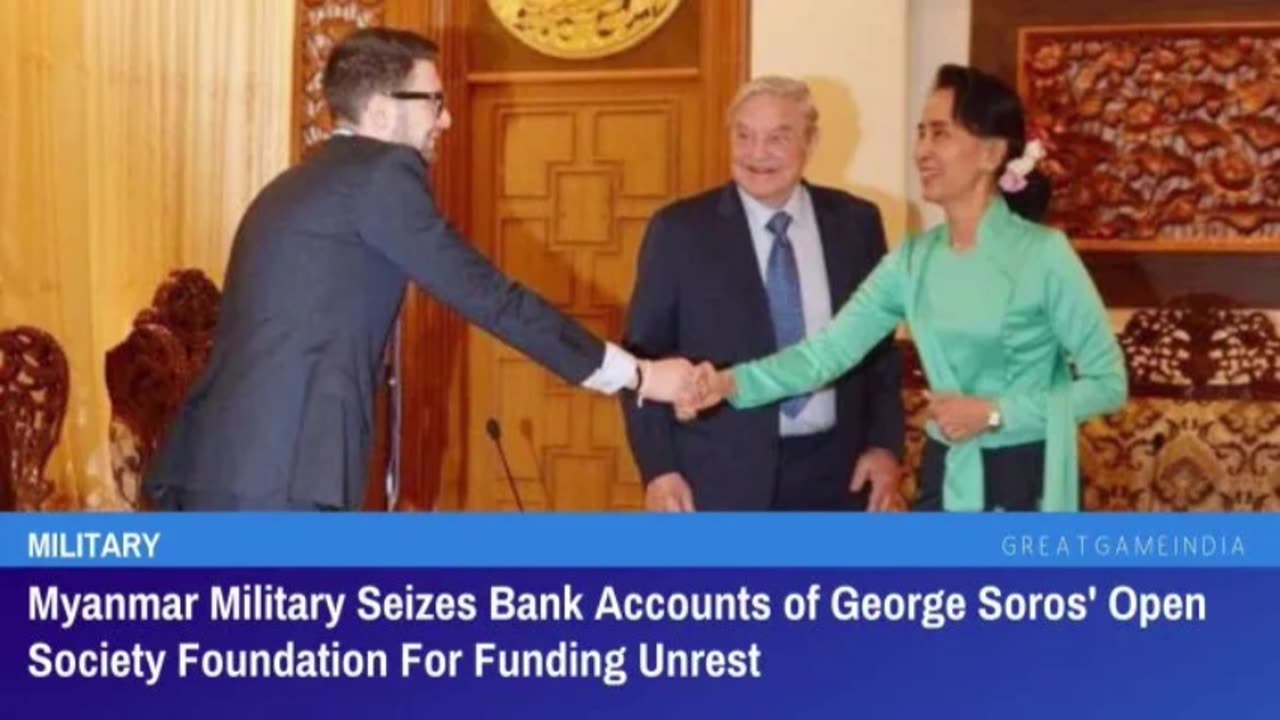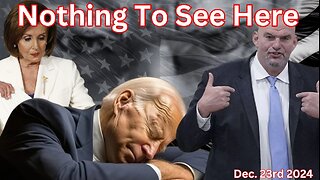Premium Only Content

Indian IC vs Soros-Geopolitical Maneuvering in South Asia
Briefing Document: Geopolitical Maneuvering in South Asia
Theme: This briefing document analyzes the geopolitical dynamics in South Asia, focusing on the roles of the United States, China, and regional actors like India and Bangladesh. It examines how the US leverages aid, alliances, and covert operations to counter China's influence in the region, highlighting the potential for conflict and instability.
Key Sources:
Source 1: International Crisis Group, "Breaking Away: The Battle for Myanmar’s Rakhine State" (2024). This report provides context on the conflict in Myanmar, a crucial battleground in the US-China rivalry.
Source 2 (Transcript A): This Hindi-language transcript discusses alleged US efforts to establish a new Christian nation by exploiting ethnic tensions between the Kuki people and Rohingya Muslims in Myanmar and Bangladesh. It emphasizes the role of covert operations and religious conversion as tools of geopolitical influence.
Source 3 (Transcript B): This Hindi-language transcript details an alleged operation by India's intelligence agency (R&AW) to expose the activities of George Soros in China during the 1980s. It suggests that Soros, through his Open Society Foundations, was covertly promoting pro-democracy movements and undermining the Chinese government.
Key Ideas and Facts:
1. US Seeking Strategic Foothold in South Asia: With India refusing to provide military bases against China and Pakistan firmly in China's camp, the US is actively seeking alternative strategic locations in South Asia. Transcript A claims:
"America’s strategy today is to work with Bangladesh and Myanmar to achieve two or three major objectives. The first objective America wants to achieve is to create a small, East Timor-like country by breaking up the territory of Bangladesh and the territory of Myanmar."
2. Allegations of Exploiting Ethnic and Religious Faultlines: Transcript A alleges a US-backed plan to create a Christian nation by exacerbating existing tensions between the Kuki people and Rohingya Muslims in Myanmar and Bangladesh. This involves:
Utilizing Christian missionaries to convert locals and promote Christianity.
Promoting a narrative of the Kuki people being ethnically Jewish to garner international support for their separatist ambitions.
Colluding with Pakistan's ISI to establish "caliphates" controlled by the Kuki, with potential backing from Israel.
3. Economic Aid as a Tool of Influence: Transcript B reveals how George Soros, allegedly acting on behalf of the US, used his financial resources to gain access to and influence Chinese officials. The establishment of the "Fund for Reform and Opening of China" aimed to promote economic liberalization, but Indian intelligence suspected ulterior motives of political subversion.
4. Historical Parallels and Lessons:
The alleged US strategy mirrors the events leading to East Timor's independence, where foreign powers exploited internal divisions.
Transcript B suggests that China learned a harsh lesson from Soros' alleged activities, hardening its stance against foreign interference, as evidenced by the Tiananmen Square crackdown.
5. Implications for Regional Stability:
The alleged US plan, if true, has severe implications for regional stability. It could lead to:
Increased ethnic and religious violence.
A refugee crisis.
Further destabilization of Myanmar.
A deterioration of US-China relations.
Heightened tensions between India and China.
6. Importance of Backchannel Diplomacy: Transcript B suggests that India, despite its rivalry with China, shared intelligence with Beijing to expose Soros' activities. This act of "goodwill" aimed to improve bilateral relations.
Analysis:
The information presented paints a concerning picture of US involvement in South Asia. While the veracity of the specific claims in the transcripts needs further verification, they highlight broader concerns about the US using covert operations and exploiting existing tensions to counter China's growing influence. The potential for these actions to backfire and further destabilize the region is significant.
Recommendations:
Verify the claims presented in the transcripts through independent sources and intelligence analysis.
Engage in diplomatic efforts to promote dialogue and reduce tensions between the Christians and Hindus.
Work with regional partners to address the root causes of conflict and instability.
Avoid actions that could exacerbate ethnic or religious divisions.
https://www.jstor.org/stable/resrep62712.12
-
 2:23:15
2:23:15
Nerdrotic
19 hours ago $15.02 earnedA Very Merry Christmas | FNT Square Up - Nerdrotic Nooner 453
137K13 -
 1:14:05
1:14:05
Tucker Carlson
19 hours ago“I’ll Win With or Without You,” Teamsters Union President Reveals Kamala Harris’s Famous Last Words
238K386 -
 1:58:31
1:58:31
The Dilley Show
19 hours ago $37.24 earnedTrump Conquering Western Hemisphere? w/Author Brenden Dilley 12/23/2024
176K50 -
 1:09:59
1:09:59
Geeks + Gamers
20 hours agoSonic 3 DESTROYS Mufasa And Disney, Naughty Dog Actress SLAMS Gamers Over Intergalactic
120K21 -
 51:59
51:59
The Dan Bongino Show
21 hours agoDemocrat Donor Admits The Scary Truth (Ep. 2393) - 12/23/2024
950K3.18K -
 2:32:15
2:32:15
Matt Kohrs
1 day agoRumble CEO Chris Pavlovski Talks $775M Tether Partnership || The MK Show
147K36 -
 28:23
28:23
Dave Portnoy
1 day agoDavey Day Trader Presented by Kraken - December 23, 2024
177K47 -
 59:29
59:29
BonginoReport
23 hours agoTrump, Murder Plots, and the Christmas Miracle: Evita + Jack Posobiec (Ep.110) - 12/23/2024
178K174 -
 2:59:14
2:59:14
Wendy Bell Radio
1 day agoNothing To See Here
139K81 -
 2:12:18
2:12:18
TheDozenPodcast
1 day agoIslam vs Christianity: Bob of Speakers' Corner
120K36